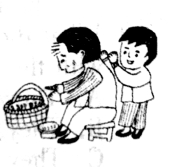题目内容
Between the innocence of babyhood and seriousness of manhood we find a delightful creature called a “boy”. Boys come in different sizes, weights, and colors, but all boys have the same belief: to enjoy every second of every minute of every hour of every day and to fill the air with noise until the adult males pack them off to bed at night.
Boys are found everywhere –--- on top of, under, inside of, climbing on, swinging from, running around, or jumping to this and that! Mothers spoil them, little girls hate them, older sisters and brothers love them, and God protects them. A boy is TRUTH with dirt on its face, BEAUTY with a cut on its finger, WISDOM with chocolate in its hair, and HOPE of the future with a snake in its pocket.
When you are busy, a boy is a trouble-maker and a noise. When you want him to make a good impression, his brain turns to jelly or else he becomes a wild creature bent on destroying the world and himself with it.
A boy with mixture---he has the stomach of a horse, the digestion of stones and sand, the energy of an atomic bomb, the curiosity of a cat, the imagination of a superwoman, the shyness of a sweet girl, the brave nature of a bull, the violence of a firecracker, but when you ask him to make something, he has five thumbs on each hand.
He likes ice cream, knives, saws, Christmas, comic books, woods, water (in its natural habitat), large animals, Dad, trains, Saturday morning, and fire engines. He is not much for girls, overcoats, adults, or bedtime.
Nobody else is so early to rise, or so late to supper. Nobody else gets so much fun out of trees, dogs, and breezes. Nobody else can put into one pocket a rusty knife, a half eaten apple, a three-foot rope, six cents and some unknown things.
A boy is a magical creature----he is your headache but when you come home at night with only shattered pieces of your hopes and dreams, he can mend them like new with two magic words, “Hi, Dad!”
1.The whole passage is in a tone of________.
A. humor and love
B. respect and harmony
C. ambition and expectation
D. confidence and imagination
2.What does the underlined sentence in Para.4 probably mean?
A. He has altogether five fingers.
B. He is slow, foolish and clumsy.
C. He has become clever and smart.
D. He cuts his hand with a knife.
3.What does the writer feel about boyhood?
A. Curious. B. Tiring. C. Delightful. D. Unsafe.
4.The writer is probably ___________.
A. A envious sister
B. A sharply observant father
C. A appreciative fond mother
D. A spoiled naughty kid
1.A
2.B
3.C
4.B
【解析】
试题分析:本文通过幽默诙谐的笔调写出男孩子的特质。
1.
2.-he has the stomach of a horse, the digestion of stones and sand, the energy of an atomic bomb, the curiosity of a cat, the imagination of a superwoman, the shyness of a sweet girl, the brave nature of a bull, the violence of a firecracker, but when you ask him to make something, he has five thumbs on each hand 有一个像马的胃口,易消化的胃,精力旺盛像个自制炸弹,极大地好奇心,极强的想象力…….关键在but,之前讲的是男孩的长处,而but之后则表示转折,显然是缺点,故选B。
3.Saturday morning, and fire engines. He is not much for girls, overcoats, adults, or bedtime.星期六早上,男孩不像女孩,穿着大衣,或者睡大觉。可以得知,故选C。
4.-he is your headache but when you come home at night with only shattered pieces of your hopes and dreams, he can mend them like new with two magic words, ?Hi, Dad!当你晚上在家的时候,他会让你感觉头痛,让你的希望和梦想都破碎了,但是他会用很有魔力的话“你好,爸爸”?从文中大体可以推断,作者是一位父亲。故选B。
考点:议论文阅读。

